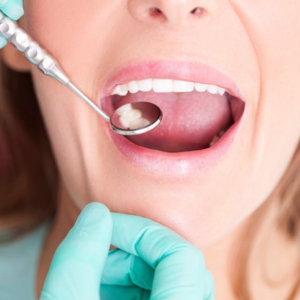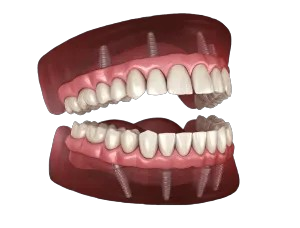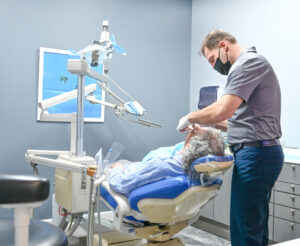
All-on-4 dental implants can offer a life-changing solution for many, but they’re not without their challenges, including all on 4 dental implants problems. From implant failure and infections to bite misalignment, understanding these issues is crucial. This article will guide you through common All-on-4 dental implants problems and how to address them.
Key Takeaways
- All-on-4 dental implants face common challenges including implant failure, infection, and bite misalignment, which require proactive management.
- Lifestyle factors, particularly smoking and pre-existing medical conditions, significantly increase the risk of complications related to All-on-4 implants.
- Choosing an experienced dental professional and maintaining good oral hygiene practices are crucial for the long-term success and functionality of All-on-4 dental implants.
Common Problems with All-on-4 Dental Implants

Careful planning and choosing a skilled dental professional can help mitigate these complications. Understanding the causes and solutions of these common problems is crucial.
Implant Failure
Implant failure is one of the most significant concerns for those with All-on-4 dental implants. Peri-implantitis, a condition characterized by inflammation and infection of the tissues surrounding the implant, often leads to bone loss and ultimately, failing dental implants. Another common cause is the lack of osseointegration, where the implant fails to bond with the bone.
Lifestyle factors such as smoking play a critical role in increasing the risk of implant failure. Smoking reduces blood flow, essential for healing post-surgery, and can double the risk of developing peri-implantitis compared to non-smokers. Additionally, gum disease can compromise the stability of dental implants by weakening the supportive gum tissue.
A consistent oral hygiene routine, such as regular brushing, flossing, and dental check-ups, is crucial for the success of All-on-4 implants. Follow-up appointments with your dentist enable early detection of potential issues and timely interventions.
Infection Risk
Infection is another common problem associated with All-on-4 dental implants. Peri-implantitis, mentioned earlier, is a type of infection that can cause significant bone and gum loss if not managed properly. Late infections, occurring long after the implant surgery, can be particularly detrimental and challenging to treat.
Reducing infection risks involves maintaining daily oral hygiene practices and sticking to professional cleaning schedules. Recognizing early signs of infection and following your dentist’s care instructions can effectively manage and prevent severe complications.
Bite Misalignment
Bite misalignment is a significant issue that can arise from improper sizing or placement of All-on-4 implants. When implants are not correctly positioned, they can disrupt the alignment of your bite, leading to discomfort, difficulties in chewing, and increased wear on surrounding teeth.
Precise planning and execution by a qualified implant specialist can help avoid these issues. Properly aligned implants improve comfort and function, enhancing the overall success rate of the procedure.
Specific Risks Associated with All-on-4 Dental Implants

Understanding and addressing these risks is crucial for anyone considering or currently having All-on-4 implants. Here are the specific risks, their implications, and preventive measures.
Gum Recession
Gum recession occurs when the gum tissue around the implants recedes, exposing the implant structures and potentially leading to failure. Patients with thin gums are particularly susceptible to this issue and may require gum grafting to protect their implants.
Regular dental check-ups help in early detection and management of gum recession. Promptly addressing this issue helps maintain the integrity of the implants and avoid severe complications.
Nerve Damage
All-on-4 dental implant surgery carries a risk of nerve damage. This is a rare but serious complication associated with the procedure. This can lead to significant pain, numbness, or other complications if not addressed immediately. Proper planning using advanced technology such as CBCT x-rays and guided implant placement can help minimize this risk.
Discussing the potential for nerve damage with your dental professional and ensuring all necessary precautions can help avoid this complication.
Sinus Issues
Sinus issues can arise when there is insufficient bone support in the upper jaw, leading to complications post-implant placement. This can cause discomfort and swelling, affecting the overall success of the implants.
Bone grafting or sinus lifts can provide the necessary support for the implants, reducing the risk of sinus complications.
Factors Increasing the Risk of Complications

Let’s explore how smoking and pre-existing medical conditions can elevate the risks and what steps can be taken to reduce those risks.
Smoking
Smoking is a major risk factor for complications with All-on-4 dental implants. It reduces blood flow, which is crucial for healing after implant surgery, and increases the risk of developing peri-implantitis. Smokers are also more likely to experience gum recession, further jeopardizing the stability of their implants.
Quitting smoking greatly improves healing and reduces the risk of complications. Maintaining good oral hygiene also supports the health of your implants.
Pre-existing Medical Conditions
Pre-existing medical conditions such as diabetes, rheumatoid arthritis, and cardiovascular disease can hinder the healing process and increase the risk of implant failure. These conditions can impair the body’s ability to recover from surgery, making it more challenging for the implants to integrate properly.
Patients with these conditions should undergo thorough medical evaluations before proceeding with the All-on-4 dental implant procedure and any necessary surgical procedure to identify and manage potential risks appropriately.
Choosing the Right Dental Professional

The surgeon’s experience and the quality of dental lab work are critical for achieving successful All-on-4 implants.
Surgeon’s Experience
The experience of the surgeon performing the All-on-4 dental implant procedure is critical. Experienced surgeons are more adept at preventing complications and ensuring the long-term success of the implants. They are also better equipped to handle any issues that may arise during or after the surgery.
Seek out dental professionals with a proven track record in All-on-4 procedures and consider patient reviews and before-and-after photos to gauge the quality of care.
Quality of Dental Lab
The quality of the dental lab work is equally important in the success of All-on-4 implants. High-quality lab work ensures that the implants are fabricated correctly and fit perfectly, which is crucial for their durability and effectiveness.
Inquire about the dental lab used by your dentist to ensure it meets high standards of precision and quality.
Preventive Measures and Best Practices

Good oral hygiene and regular follow-up appointments are crucial for maintaining the oral health of All-on-4 implants.
Good Oral Hygiene
Good oral hygiene is vital for the success of All-on-4 dental implants. Poor habits like smoking increase the risk of implant failure. Use a soft-bristled toothbrush and non-abrasive toothpaste to clean around the implants effectively.
Daily flossing and the use of antimicrobial mouthwashes can help prevent plaque buildup and reduce the risk of gum disease. Dental professionals can provide tailored advice during follow-up visits to optimize implant care.
Regular Follow-up Appointments
Regular follow-up appointments are essential for monitoring the health of All-on-4 implants. These routine check-ups allow dental professionals to detect potential complications early and provide timely interventions.
Regular maintenance and care can significantly prolong the lifespan of the implants and ensure their long-term success.
What to Do If You Experience Problems

Consulting with a qualified dentist is crucial for addressing complications and exploring available treatment options. Here are the steps to take if problems arise and the treatment options available.
Seeking Professional Help
Discomfort and swelling are key indicators that you should seek professional dental advice immediately. The first step is to schedule a consultation with your dentist to discuss the issues and potential solutions.
Discuss refund options if you face significant problems with your dental implants.
Treatment Options
Various treatment options exist to address implant failures and other complications, such as revising the implant placement at the implant site or using alternative designs. Prompt treatment is essential in cases of severe nerve damage to prevent further complications.
If there is a procedural error in the dental implant, refunds or replacements may be offered to the patient.
Summary
In summary, understanding the common problems and specific risks associated with All-on-4 dental implants is crucial for anyone considering or currently having this procedure. By choosing a qualified dental professional, maintaining good oral hygiene, and adhering to regular follow-up appointments, patients can significantly improve the success rate of their implants.
Ultimately, being informed and proactive in your dental care can help you enjoy the many benefits of All-on-4 dental implants while minimizing potential complications.
Frequently Asked Questions
What are the most common problems with All-on-4 dental implants?
The most common problems associated with All-on-4 dental implants are implant failure, an increased risk of infection, and bite misalignment. Ensuring proper placement and regular follow-up care can help mitigate these issues.
How can I reduce the risk of infection after getting All-on-4 dental implants?
To reduce the risk of infection after getting All-on-4 dental implants, maintain rigorous daily oral hygiene and schedule regular professional cleanings and follow-ups. This proactive approach is crucial for your long-term oral health.
What should I do if I experience discomfort or swelling after my implant surgery?
If you experience discomfort or swelling after implant surgery, it’s crucial to consult your dentist promptly. They can evaluate your symptoms and recommend appropriate solutions to ensure proper healing.
How important is the experience of the surgeon performing the All-on-4 procedure?
The experience of the surgeon is crucial for the All-on-4 procedure, significantly influencing the long-term success of the implants and minimizing potential complications. Choosing an experienced surgeon can greatly enhance your outcomes.
What preventive measures can I take to ensure the success of my All-on-4 dental implants?
To ensure the success of your All-on-4 dental implants, prioritize good oral hygiene and maintain regular follow-up appointments with your dentist. These practices are crucial for the long-term health and longevity of your implants.
